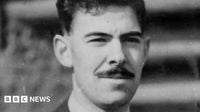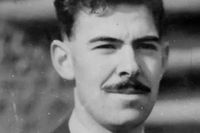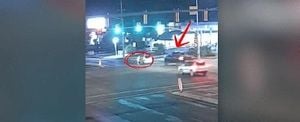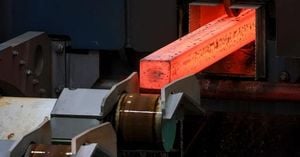John Cruickshank, the last surviving recipient of the Victoria Cross from World War Two, has died at the age of 105, marking the end of a remarkable chapter in British military history. Cruickshank, an Aberdeen native whose quiet heroism became legendary, passed away last week, his family confirmed. A private funeral will be held, in keeping with his lifelong modesty.
Born on May 20, 1920, in Aberdeen, Scotland, John Alexander Cruickshank grew up in the shadow of the First World War and came of age as the world plunged into a second, even more devastating conflict. According to BBC, he joined the Royal Air Force (RAF) after an early career in banking and a stint with the Territorial Army. By 1944, he was a flight lieutenant in No. 210 Squadron, piloting the mighty Catalina flying boats on anti-submarine patrols over the treacherous waters of the Norwegian Sea.
It was on June 17, 1944 (though some records note July 17), that Cruickshank’s name was etched into the annals of valor. That day, after eight long hours on patrol, his crew’s radar picked up a distant contact: a German U-boat, later identified as U-347. As The Telegraph recounts, Cruickshank approached the submarine and ordered recognition signals, but the response was a barrage of anti-aircraft fire. Undeterred, he maneuvered his Catalina to attack at just 50 feet above the waves, his gunners raking the enemy’s conning tower.
But fate intervened—the bombs failed to release. Under heavy fire, Cruickshank circled and made a second run, this time releasing the depth charges himself. They struck true, destroying the submarine. However, the victory came at a terrible cost. Navigator John Dickson was killed instantly, and several crew members, including Cruickshank, were gravely wounded. Cruickshank himself suffered 72 wounds, with two to his lungs and ten to his lower limbs. Despite the agony and the chaos, he refused morphine, fearing it would cloud his judgement, and insisted on flying the crippled aircraft back to base at Sullom Voe in Shetland.
“You don’t get involved in that kind of thing thinking of any decorations or any recognition. It was regarded as duty,” Cruickshank said in 2008, as reported by BBC. His humility was as striking as his courage. He needed a blood transfusion before he could even be moved to hospital, yet never once did he consider abandoning his post or his crew.
For this extraordinary act of bravery and leadership under fire, Cruickshank was awarded the Victoria Cross—the highest recognition for valour in the British and Commonwealth Armed Forces—on August 29, 1944. King George VI presented the medal, with the citation praising Cruickshank for his “determination, fortitude and devotion to duty in keeping with the highest traditions of the Service.”
Cruickshank was just 24 at the time of the attack. He never returned to operational flying after his recovery, instead leaving the RAF in 1946 to resume his banking career. His life after the war was marked by the same quiet dedication he had shown in combat. He married Marion Beverley of Toronto in 1955, though the couple had no children. Marion passed away in 1985.
Despite the fame his Victoria Cross brought, Cruickshank rarely spoke about his wartime experiences. According to Aberdeen Live, his bravery was commemorated in the comic book Victor, and he was much in demand at reunions and commemorative events. Yet, those who met him were often struck by his modesty and dry wit—a man who, in his own words, felt he had simply done his duty.
His legacy was further honored in recent years. In 2013, Cruickshank took to the skies once more in a Catalina at the RAF Leuchars Airshow, reliving the aircraft that had defined his wartime service. For his 104th birthday in 2024, a Catalina flying boat made a special flight over his Aberdeen home, a tribute to both his longevity and his enduring place in the hearts of his fellow Scots and veterans alike.
In a poignant twist, Cruickshank was presented with the Air Efficiency Award in 2024—75 years after he should have received it. Retired Group Captain Bob Kemp of the Royal Auxiliary Air Force Foundation noticed the absence of the medal from Cruickshank’s collection, researched his eligibility, and successfully petitioned for the overdue honor. "John Cruickshank’s many honours and awards clearly distinguish him as one of the thousands of RAF reservists who have given so much in the service of this country," Kemp remarked at the ceremony.
Cruickshank’s story is not just one of individual heroism but also of the collective sacrifice of a generation. He was the last of 181 individuals to receive the Victoria Cross for actions during World War Two, and the final living recipient for air action. Only four men from Coastal Command were awarded the VC during the conflict, three of them posthumously. Cruickshank’s survival and long life offered a living link to a time when the fate of nations hung in the balance—and when ordinary people performed extraordinary deeds.
After the war, Cruickshank’s career took him from Scotland to Asia and Africa in the world of international banking, before he returned home in 1977. He retired finally in 1985, but remained active in veterans’ organizations, serving as Honorary President of the Aircrew Association and attending events such as the Queen’s unveiling of the national monument to Coastal Command at Westminster Abbey in 2004.
His passing leaves a void for those who value courage, humility, and service. As The Telegraph noted, Cruickshank once commented with characteristic humor and self-awareness, “When I go, I suppose I had better put out the light.”
John Cruickshank’s life stands as a testament to the power of duty and quiet resolve. His actions on that fateful day in 1944 saved lives and inspired generations. Now, with his passing, the light of a remarkable era dims, but its lessons endure.





